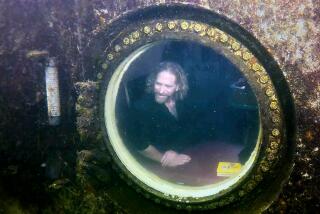Biology Teacher Gets Education Of His Own In Sea World Program
- Share via
Biology teacher Gary Blume is already preparing next year’s homework for his 200 unsuspecting students at Clairemont High in San Diego. At the same time, he’s doing some homework of his own at Sea World this summer.
Blume, 31, will spend eight weeks this summer collaborating with Sea World marine biologists in monitoring seals and sea lions on the Channel Islands, studying sea otters in Morro Bay and observing the changing ecosystem of Mono Lake in the Eastern High Sierra.
He is also working with the education staff on the Sea World grounds to develop curriculum materials that will be used by the San Diego Unified School District for high school biology courses and in teacher education workshops.
Blume was awarded the first Teacher Summer Internship by the Sea World Research Institute, a position established earlier this year through the San Diego Gas & Electric/Dave DeMotte Fellowship Fund and the Sea World education department.
‘We Reach Thousands’
The eight-week internship is modeled on recent industry and education consortiums, according to SWRI director Donald B. Kent. “By educating one teacher--this case in the field of marine research--we reach thousands of students.”
“This program was designed specifically for teacher enrichment,” said Gayle Benn, spokeswoman for the research institute. “Gary is our contact for what goes on in the high school biology class today, and he can learn from us what goes on out in the scientific work world.”
Among Blume’s research projects that will be turned into curriculum for a marine biology course or used as additional material in the regular biology course:
- A study of how ocean oil spills affect the sea otter and how otters can be kept away from spills.
- The identification banding of sea gulls at Mono Lake to determine their migration patterns. The water level of Mono Lake, an important way station for hundreds of migrating birds, has been dropping because streams that feed the lake are diverted into the Los Angeles Aqueduct. The falling level of the lake has affected the ecosystem, Blume said.
- A study of how exercise might benefit animals confined to small cages. This project involves comparing the bone densities of marine mammals with the bone densities of land mammals, such as the sea otter and the cheetah.
After his internship, Blume said he can help the research institute by identifying and training potential marine biologists. The goal is to reach them and offer them some career counseling while they are still deciding where to go to college, Blume said.
“If a student with a strong science background graduates from high school here and stays in this area to go to college, hopefully a good work force is built here,” Blume said. “I’m not only developing classroom material for my students, I’m finding out what the job opportunities are for those who study biology.”
Blume, a UC Berkeley graduate in forestry and biology, was chosen from a field of 10 applicants for the internship.
The internship will allow him to combine his love of nature with work.
“Usually, when I go on a vacation, I go backpacking and I look for ideas to bring back to the classroom. But gosh, I’m being paid to do that now.”
The internship program is supported by money donated in memory of Sea World founder Dave DeMotte, who died in May, 1986.
More to Read
Sign up for Essential California
The most important California stories and recommendations in your inbox every morning.
You may occasionally receive promotional content from the Los Angeles Times.









